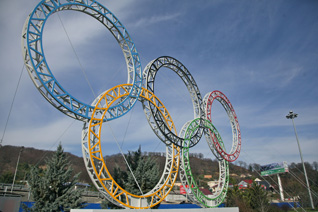Officials from the International Olympic Committee (IOC) on Wednesday reported that there is a “true momentum” of interest from regions considering hosting the 2030 Olympic Winter Games, and the list of engaged parties continues to grow. Decisions made by the Executive Board last December to explore specific new hosting options is being credited for the recent uptick.

“We have a true renewed interest and it is incredibly reassuring, we have a number of parties that have come to the table,” IOC Executive Director Christophe Dubi told GamesBids.com at a press conference following day two of a quarterly Executive Board meeting being held in Lausanne, Switzerland.
Dubi referenced a report presented by Future Host Commission Chair Octavian Morariu as he mentioned the number of interested parties had “increased” since he last reported six regions were involved in continuous dialogue, and that the number is now “increasing”.
As many as five regions were discussing potential Winter Games bids last year, but by December only one project remained in serious contention. Ukraine’s bid was shelved after the start of the Russian invasion; a Spanish bid withdrew after internal political differences; Vancouver stepped back when the provincial government denied funding and Sapporo in Japan hit pause while the nation deals with the growing Tokyo 2020 corruption scandal. Salt Lake City remains the only candidate but has stated it prefers to host in 2034 and would only step in to host in 2030 if another qualified region was not found.
The Executive Board was expected to announce the preferred 2030 host at December’s meeting but instead it stopped the diminishing race and charged the Future Host Commission with exploring the future bid landscape. Now the commission is looking at the possibility of a permanent rotating pool of hosts; a dual 2030/2034 awarding of the Games and set benchmarks of climate and environmental factors needed to be met before a potential host can apply.
In February, a feasibility study was launched in Sweden to explore a follow-up to Stockholm’s failed bid for the 2026 Games that was lost to Milan Cortina. Seven cities had entered that race before five dropped out for various political and economic reasons.
“This work is ongoing,” Dubi said explaining that the mere possibility of these changes is creating interest among potential hosts.
“We walk the talk,” he added, pointing to the organization of the Milan Cortina 2026 where existing venues are being leveraged across Northern Italy with much lower costs and risks than previous Games.
He said that the prospect of rotating hosts was important economically to some of the interested parties explaining “the fact that the Games can come back at a different point in time is appealing.”
Dubi explained that the new continuous dialogue style bid process is much less of a burden on interested parties where the IOC does much of the work, and due to the private nature of the engagement there are “no more losers as we painfully had at the time.”
But due to the privacy, Dubi said he could not name the new parties involved in discussions other than confirming that Vancouver’s stalled bid known as BC 2030 could be back at the table in the new context.
“They had a project at the time and our understanding is that conversations will take place again between the COC [Canadian Olympic Committee] and the local authorities,” he said. “This is in the next few weeks. Until then no further work could be done from us or the COC but we understand that discussions will take place so we look forward to hearing the results of these.”
A COC statement to GamesBids.com acknowledged that a bid was still in play but did not confirm any upcoming meeting with the Province of British Columbia, the government entity required to approve funding.
“We have now completed our work on the operational component of our bid to bring the Olympic and Paralympic Winter Games back to British Columbia in 2030. That proposal has not changed,” the statement read.
“We remain hopeful that there will be an opportunity for all partners to come together to talk about the vision for the Games, and the lasting impact hosting a Games could have on the Host Nations, the province, and the rest of Canada.
Results of the studies and recommendations moving forward will be made by the Future Host Commission in the coming months and decisions will likely made at the Executive Board meeting in October. The IOC members could rubber-stamp those decisions at the 140th IOC Session that was confirmed on Wednesday to be held at Jio World Centre in Mumbai, India on October 15, 16 and 17.
That will pave the way for the selection of preferred candidates for 2030, 2034 or for a permanent rotation. Dubi said that work will follow, but there will be no rush.
“If you look at those parties that come to the table at this point in time, these are very mature winter markets so I’m definitely not worried with the timing knowing that we’re going to go to a region or a country that have the infrastructure and are used to organizing high level event, being World Cups or World Championships so we are not pressed by time for the election,” Dubi said, when asked by GamesBids.com.

